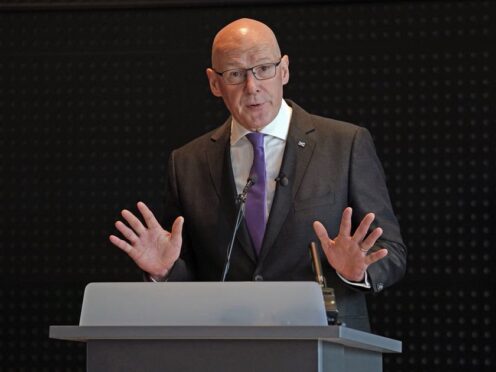
Scotland’s First Minister has hit out at Rishi Sunak over the “astonishing” decision to tighten migration policies for those seeking to come to the UK.
John Swinney criticised the Prime Minister for posting on social media that people such as care workers and overseas students looking to bring dependent family members with them had been “stopped”.
Instead, Mr Swinney insisted such people should be “welcome”.
His comments came in his first speech on Scotland’s economy since taking over as First Minister, with Mr Swinney saying that growing the country’s population was “central” to what he described as an “ambitious agenda for growth and opportunity in Scotland”.
We’ve taken action to reduce migration.
Student dependant applications are now down by 80%. pic.twitter.com/x5dWiUK1F4
— Rishi Sunak (@RishiSunak) May 15, 2024
His comments came after the UK Migration Advisory Committee warned earlier this week that recent policy changes – such as the ban on many overseas students bringing dependants and the increase in the salary thresholds for the skilled worker route – would have an impact the number of overseas graduates working in the UK.
Mr Swinney, making a speech at Barclays Glasgow Campus on Friday, said: “The UK Government is now celebrating making it harder for overseas masters students to study in the United Kingdom and for overseas care staff to work in the UK.
“I find that astonishing as a First Minister wrestling with a social care crisis in our communities and the necessity to encourage and fuel the dynamism of our universities.”
With Mr Swinney adding that future population growth in Scotland is more likely to come from migration, the First Minister insisted: “It is in Scotland’s interests to have a more generous system, not a tighter one.”
He said students should be allowed to stay and work for five years after completing their studies, to encourage the “best and brightest” to remain.
He also said there should be a “return to the approach of European freedom of movement” – although he accepted there was “little prospect” of this happening “while Scotland’s migration policies are decided at Westminster”.
Mr Swinney also reminisced on the Fresh Talent scheme brought in by former first minister Jack – now Lord – McConnell, which sought to allow university students who studied in Scotland to continue to live in the country.
“We’ve got a problem, we’ve got a real problem about population and that’s because of Brexit, its calamitous implications for us and this uber-hostile towards migration,” he said.
He added that if Scotland was to be “realistic” about the challenges facing the country, immigration should be seen as a starting point.
The First Minister’s comments came as he insisted his desire to tackle the “curse” of child poverty could “go hand in hand” with boosting Scotland’s economy.
Mr Swinney said that ensuring the country has a ‘strong, successful, innovative and dynamic economy” would be “crucial” in such work.

He said: “There is no conflict in my mind on the priorities of my Government between eradicating child poverty and boosting economic growth.
“For me and for my Government eradicating child poverty and boosting economic growth go hand in hand.”
He promised there would be a “collaborative and inclusive” approach when working with business, with Mr Swinney pledging decisions would only be made “after careful listening and full engagement”.
He also vowed Government would have a “can-do” approach, with fewer strategy documents and more action.
Mr Swinney said: “Government must have a can-do attitude, we must search to remove obstacles, we must offer certainty to those prepared to make commitments to our economy.”
He stressed the need for the Government to be “focused on making things happen”, with the First Minister adding: “Bluntly, I will demand from Government more concrete actions and fewer strategy documents.
“I want the first question we ask ourselves to be, ‘what can we do?’ rather than ‘what can we write down?’”
In his appointment of Kate Forbes as Deputy First Minister and Economy Secretary, Mr Swinney dropped the title of wellbeing economy secretary put in place by his predecessor.
But asked about the decision after his speech, he urged people not to “read into” the decision, committing to ensuring Scotland has an “inclusive economy that focuses on the wellbeing and satisfaction of individuals”.
The First Minister was also keen to say he was “proud” of the SNP’s record in Government.

Enjoy the convenience of having The Sunday Post delivered as a digital ePaper straight to your smartphone, tablet or computer.
Subscribe for only £5.49 a month and enjoy all the benefits of the printed paper as a digital replica.
Subscribe